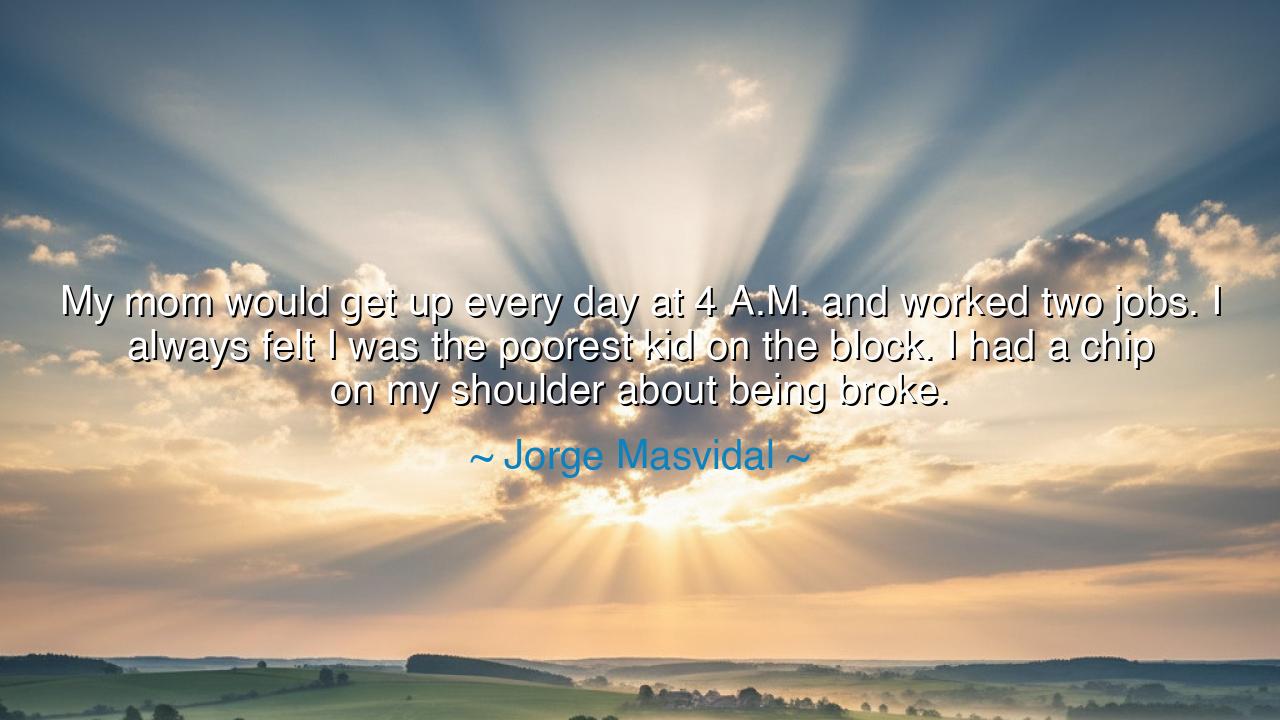
My mom would get up every day at 4 A.M. and worked two jobs. I
My mom would get up every day at 4 A.M. and worked two jobs. I always felt I was the poorest kid on the block. I had a chip on my shoulder about being broke.






Hear the voice of Jorge Masvidal, who remembered the fires of his youth with both pain and pride: “My mom would get up every day at 4 A.M. and worked two jobs. I always felt I was the poorest kid on the block. I had a chip on my shoulder about being broke.” In these words lies not only the story of one man, but the eternal story of struggle and the shaping of strength from hardship. It is the voice of a son forged by the labor of his mother, by the hunger of poverty, and by the burning desire to rise beyond it.
The image of a mother rising before dawn, her body weary yet unwilling to yield, is a timeless symbol of sacrifice. She gave her hours, her health, her very spirit, so that her child might endure. Such sacrifices are older than empires, repeated in countless homes across the ages: the parent who works unseen, who suffers quietly, who sows seeds of survival in silence. Her labor at two jobs was not for glory, but for love—a love that demanded not words but action, not promises but perseverance.
Masvidal speaks also of the sting of being the poorest. Poverty is not only the lack of bread, but the wound of comparison, the humiliation of feeling less than others. To be young and broke while seeing wealth in neighbors is to carry an invisible weight, one that gnaws at pride and festers into anger. This chip on the shoulder he describes is the spark of resentment, but also the ember of determination. For many who endure poverty, it becomes either a chain that binds them down or a fire that drives them forward.
History gives us many who bore this same fire. Consider Abraham Lincoln, born in a log cabin, raised in poverty, with little more than borrowed books and candlelight. He too carried the burden of being poor, mocked for his rough clothes and meager beginnings. Yet that wound became his weapon, sharpening his resolve, giving him the strength to endure ridicule and hardship until he stood as president of a divided nation. Like Masvidal, Lincoln turned the chip on his shoulder into a crown of resilience.
There is, however, a deeper wisdom here: that hardship, though bitter, can refine the soul. The poorest child may learn gratitude more than the richest, endurance more than the comfortable, hunger for achievement more than the complacent. But such transformation is not automatic—it requires will, courage, and the refusal to be broken. Masvidal’s words are proof that the seed planted in the soil of poverty can either wither or grow into unshakable strength.
The sadness of poverty is real, but so too is its hidden gift: clarity. Those who are broke learn early that nothing is given freely, that survival demands sacrifice, that honor is not handed down but carved from struggle. Such lessons, though cruel, prepare the soul for battles greater than hunger. They forge warriors, leaders, and builders who carry within them the memory of their mothers’ labor and their own hunger.
The lesson, then, is this: do not despise your struggles, nor curse the days of scarcity. Let them sharpen you. Let them remind you of what truly matters—love, sacrifice, endurance, and the refusal to surrender. If you are poor, let that chip on your shoulder drive you not toward bitterness, but toward greatness. And if you are blessed with abundance, remember the unseen mothers who still rise at 4 A.M., working in silence for their children.
Thus, the teaching endures: poverty may strip you of comfort, but it cannot strip you of will. To rise above it is to honor the sacrifices made for you, to turn resentment into resolve, and to live in such a way that the struggles of the past become the foundation of triumph. For the strongest souls are not born in ease, but in the fire of hardship, and their victories carry the weight of every dawn their parents rose to labor.






AAdministratorAdministrator
Welcome, honored guests. Please leave a comment, we will respond soon